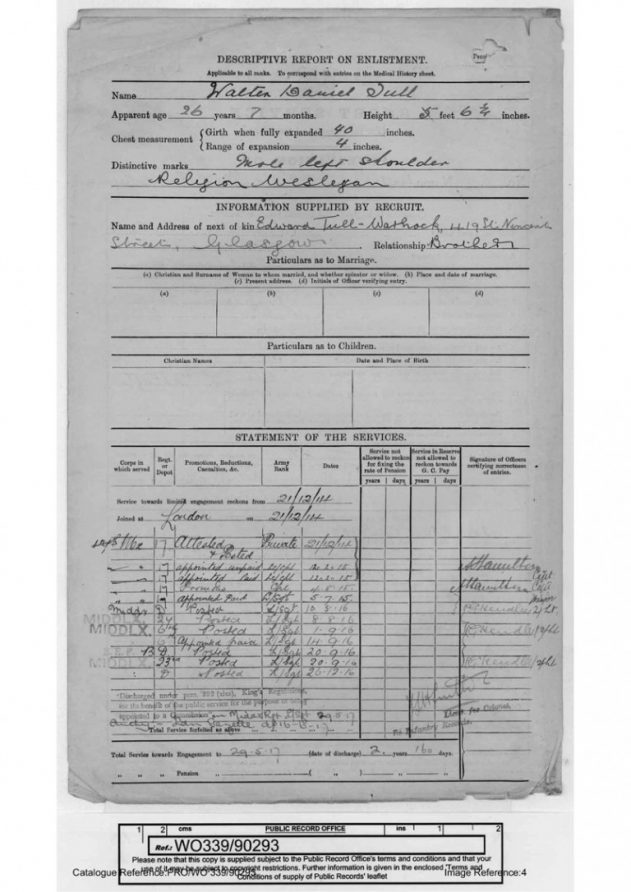I have always had a love of sport, especially football, and I first became interested in Walter Tull when I was trying to find possible football players listed in the 1901 Census (RG 13/296), which had just been released at the time. Following further research I found that he was from an underprivileged background, and was orphaned at an early age. He was one of the first black professional footballers, who suffered from racial bigotry at a time when racism was tolerated. He was supposedly the first black officer in the British Army at a time when the manual of Military Law forbade non-Europeans from becoming combat officers.
Walter Daniel John Tull was born in Folkestone, Kent, on 28 April 1888. His father Daniel came to Britain from Barbados in 1876, joined the Methodist Church, and in 1880 married a local girl, Alice Elizabeth Palmer, who bore him six children.
Death in the family
In 1895, Walter’s mother died. The following year, Daniel married Clara Palmer, but he then died in 1897. Clara was unable to cope with looking after all six children and consequently in February 1898 Walter and his brother Edward were sent to a Wesleyan Methodist orphanage in Bonner Road, Bethnal Green, where Walter spent seven years.
After finishing his schooling he served as an apprentice printer; but in October 1908, whilst playing for the children’s home football team, he was invited to join Clapton FC, a top amateur team. He helped them to victory as an inside forward in the FA Amateur Cup, the London Senior Cup and the London County Amateur Cup that same season. His promising talent attracted the attention of Tottenham Hotspur who signed him on for a fee of £7 in July 1908. While still an amateur, Walter was invited to tour Argentina and Uruguay with Spurs, signing him on as a professional on his return.
The first black outfield player
Walter was only the second black professional footballer in Britain, the first being Arthur Wharton, the Preston North End goalkeeper. He was the League’s first black outfield player, and attracted considerable media interest, being described as very good indeed with ‘a class superior to that shown by most of his colleagues’. Walter retained his place in the side at the start of the new season, appearing at centre forward in Spurs’ First Division debut, away to Sunderland, which ended in a 3-1 defeat. Walter’s future looked bright, scoring his first goal against Bradford, but then after only seven first team games he was dropped. This was probably as a consequence of the racial abuse he received from fans when playing at a game against Bristol City in 1909, which the Football Star called ‘language lower than Billingsgate’.
This unforgivable attack was laid at the door of the dockers and locals; and was influenced by Bristol’s 18th and 19th century reputation as a slave port. Whatever the reason it was an awful assault on a mild, intelligent and dedicated young man. Although there was no evidence that Walter’s confidence and form were affected, the incident was deeply traumatic for Tull, and rather than stand by their player, the Club’s directors were embarrassed by the whole debacle.
Leading up to the war
The following season he played only three first team games, scoring against Manchester City, and he was consigned to the reserves, where he played 27 times, scoring 10 goals. The season after, in October 1911 he was sold for a ‘heavy transfer fee’ to Northampton Town, an ambitious Southern League side managed by Herbert Chapman, an ex-Spurs player, who had no doubt about Tull’s background or ability. At Northampton Walter did not make an inspiring debut against Watford, and his early form was disappointing. However soon his career flourished at the club and he was probably their biggest star, having converted to a midfield role, to counteract his supposed lack of pace as a forward. He barely missed a game, completing 98 out of 114 games up to the outbreak of the First World War. There was much speculation that but for the war Walter would have signed for Glasgow Rangers.
This article has been adapted from the National Archives blog, and is reproduced under the terms of the Open Government License.

No Comments
Add a comment about this page